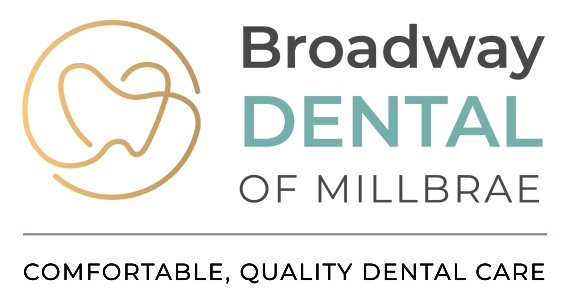Book Now
What Are the Best Ways to Soothe Teething Pain in Infants?
Millbrae, CA

Teething can be a challenging period for both infants and parents. As those tiny teeth begin to emerge, your baby might experience discomfort and pain, leading to sleepless nights and cranky days. Understanding how to soothe teething pain in infants is crucial for ensuring their comfort and well-being. At Broadway Dental of Millbrae, we’re here to guide you through this journey with expert advice and practical tips.
Understanding Teething Pain in Infants
Teething typically starts around six months of age, though it can begin as early as three months or as late as twelve months. The first teeth to appear are usually the lower front teeth (central incisors), followed by the upper front teeth. By the time your child is three years old, they should have a full set of 20 primary teeth.
Signs and Symptoms of Teething
It’s essential to recognize the signs of teething so you can provide the right care for your infant. Common symptoms include:
- Irritability and Fussiness: The pain and discomfort of teething can make your baby more irritable than usual.
- Drooling: Increased saliva production is a common sign of teething.
- Chewing on Objects: Babies tend to chew on toys, fingers, or any object they can get their hands on to relieve the pressure on their gums.
- Swollen Gums: You might notice that your baby’s gums are red and swollen where a tooth is about to emerge.
- Interrupted Sleep Patterns: The discomfort can cause babies to wake up more frequently during the night.
The Best Ways to Soothe Teething Pain
There are numerous strategies and remedies available to help soothe your baby’s teething pain. These range from natural home remedies to professional dental care. Here, we explore the best methods:
1. Cold Compresses for Teething Pain Relief in Infants
Applying a cold compress can provide immediate relief for sore gums. You can use a chilled (not frozen) teething ring, a cold spoon, or a clean, damp washcloth that has been chilled in the refrigerator. According to a study published in the journal Pediatrics, cold therapy is effective in reducing inflammation and numbing the pain associated with teething.
2. Teething Toys for Comfort
Teething toys are designed to provide comfort by massaging the gums and offering a safe object for your baby to chew on. Look for toys made from non-toxic materials and avoid those filled with liquid that could leak. A survey by the American Academy of Pediatric Dentistry (AAPD) found that 80% of parents used teething toys to help soothe their infants’ pain.
3. Massage the Gums
Gently massaging your baby’s gums with a clean finger can help alleviate the pain. This pressure can provide temporary relief and comfort. The ADA suggests using clean hands and gentle pressure to reduce discomfort.
4. Over-the-Counter Remedies
There are various over-the-counter gels and ointments specifically designed for teething. However, it’s crucial to consult your child’s pediatrician before using these products to ensure they are safe and appropriate. Benzocaine-containing products should be avoided in children under two due to the risk of methemoglobinemia, a rare but serious condition.
5. Breastfeeding or Bottle Feeding
Sometimes, the act of sucking can provide comfort to a teething baby. Breastfeeding or bottle feeding might help soothe them, though some babies might refuse to nurse due to gum pain. A study in the International Breastfeeding Journal found that breastfeeding during teething could help reduce pain and discomfort.
Professional Dental Care for Teething Pain
1. Consultation with a Pediatric Dentist
Regular visits to a pediatric dentist can help monitor your child’s oral health and teething progress. A professional can provide personalized advice and identify any issues early on. At Broadway Dental of Millbrae, we specialize in children’s dental care, ensuring your child’s comfort and health.
2. Fluoride Treatments
Fluoride treatments can help strengthen the enamel of your baby’s emerging teeth, reducing the risk of cavities and providing added protection. The CDC recommends fluoride varnish application every three to six months for children at risk of dental caries.
3. Dental Checkups
Routine dental checkups are essential. According to the American Academy of Pediatric Dentistry, a child should visit a dentist by their first birthday or within six months after their first tooth appears. Regular visits help in preventing potential dental problems and maintaining good oral hygiene.
Research Data and Facts About Teething Pain
1. Prevalence and Duration
According to the American Dental Association (ADA), the teething process typically lasts about 8 days per tooth, including the 4 days before and 3 days after the tooth emerges. This period can vary depending on the child and the specific tooth.
2. Impact on Sleep
A study published in the Journal of Pediatric Dentistry found that teething can significantly disrupt an infant’s sleep patterns, leading to increased nighttime awakenings and shorter sleep durations. This study observed that 45% of parents reported sleep disturbances during their child’s teething phase.
3. Parental Responses
Research indicates that most parents use a combination of home remedies and over-the-counter medications to manage teething pain. However, there’s a growing preference for natural and non-pharmaceutical approaches. A survey by the National Institute of Child Health and Human Development found that 67% of parents preferred natural remedies over medicated gels.
Tips and Tricks for Managing Teething Pain
1. Keep It Clean
Maintaining good oral hygiene is crucial, even before the first tooth appears. Use a clean, damp cloth to wipe your baby’s gums after feedings. Once teeth emerge, start brushing them with a soft-bristled toothbrush and water. The ADA emphasizes the importance of early dental care to prevent future issues.
2. Avoid Certain Foods
During the teething period, avoid giving your baby hard or sharp-edged foods that could hurt their gums. Instead, offer soft foods like yogurt, mashed potatoes, or applesauce. These foods are not only gentle on the gums but also nutritious.
3. Monitor for Fever
While a slight increase in temperature can be normal during teething, a high fever is not. If your baby develops a fever, it’s important to consult a pediatrician to rule out other causes. The AAPD notes that fever above 100.4°F is not typically associated with teething and should be evaluated by a healthcare provider.
DIY and Professional Solutions
1. Home Remedies
- Chamomile Tea: Chamomile has natural soothing properties. You can brew chamomile tea, let it cool, and then use a clean cloth to apply it to your baby’s gums. Research published in Phytomedicine shows that chamomile has anti-inflammatory and pain-relieving effects.
- Frozen Fruit: For older babies who are already eating solids, offering a frozen banana or apple slice can provide relief. Ensure the fruit is large enough to prevent choking hazards.
2. Professional Solutions
- Dental Advice: Your pediatric dentist can offer specific advice tailored to your baby’s needs. At Broadway Dental of Millbrae, we provide comprehensive teething guidance and support.
- Orthodontic Appliances: In some cases, orthodontic appliances may be recommended to help with the alignment of emerging teeth and reduce discomfort. The use of such appliances can be determined during routine dental visits.
Why Choose Broadway Dental of Millbrae?
At Broadway Dental of Millbrae, we understand the challenges of teething and are dedicated to providing the best care for your little ones. Our experienced children’s dentist in Millbrae offers a range of services to ensure your child’s oral health is maintained from infancy through adolescence.
1. Personalized Care
We take the time to understand each child’s unique needs and provide customized care plans to address their teething and dental health. Our approach is tailored to ensure your child’s comfort and well-being.
2. Friendly Environment
Our clinic is designed to be welcoming and child-friendly, making dental visits a positive experience for both children and parents. We strive to create an atmosphere where your child feels safe and comfortable.
3. Advanced Technology
We use the latest dental technology to provide safe and effective treatments, ensuring the best outcomes for your child’s dental health. Our state-of-the-art equipment allows for precise and gentle care.
Conclusion
Teething can be a tough phase, but with the right knowledge and care, you can help soothe your baby’s discomfort and ensure their oral health. From home remedies to professional dental care, there are many ways to manage teething pain. At Broadway Dental of Millbrae, we’re here to support you every step of the way. If you have any concerns about your baby’s teething or oral health, don’t hesitate to contact us. Our dedicated team is here to help your child grow up with a healthy, beautiful smile.


